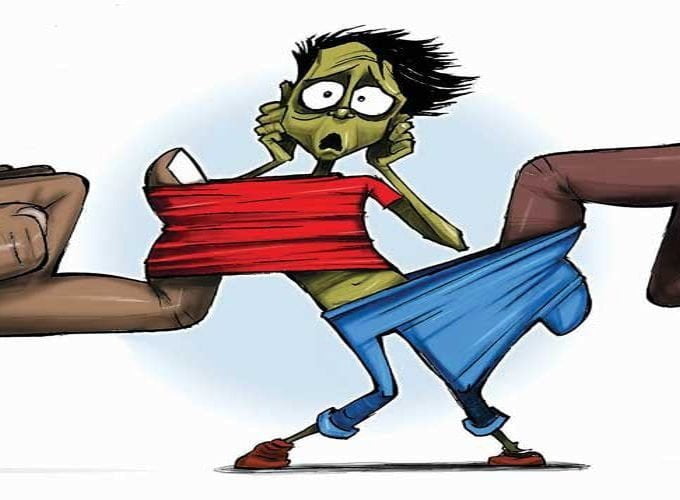Abstract: Verbal abuse is a form of emotional abuse that can occur in various settings such as romantic relationships, family, work, and school. It involves the use of words to cause harm, distress, or humiliation to the victim. This blog post provides an in-depth look at verbal abuse, its impact on mental health, and ways to cope with it. The post is organized into ten main headings, with three subheadings per section. Each subheading highlights different aspects of the topic and provides seven points related to it.
What is Verbal Abuse?
Verbal abuse is a form of emotional abuse that involves the use of words to cause harm, distress, or humiliation to the victim. It can happen in different settings such as romantic relationships, family, work, and school. Verbal abuse is often difficult to identify because there are no physical bruises or scars to show. However, the impact of verbal abuse can be just as damaging as physical abuse. In this blog post, we will explore the different aspects of verbal abuse, its impact on mental health, and ways to cope with it.
Definition and Types of Verbal Abuse
- Verbal abuse is a form of emotional abuse that involves the use of words to cause harm, distress, or humiliation to the victim.
- Verbal abuse can take different forms such as insults, name-calling, shouting, threatening, and belittling.
- Verbal abuse can happen in various settings such as romantic relationships, family, work, and school.
Types of Verbal Abuse
- Name-calling: This involves using derogatory names to insult the victim, which can be humiliating and degrading.
- Shaming: This involves using words to make the victim feel ashamed or embarrassed about their actions, appearance, or behavior.
- Threatening: This involves using words to intimidate or scare the victim, which can lead to fear and anxiety.
Signs of Verbal Abuse
- The victim may become withdrawn or depressed.
- The victim may show signs of anxiety or fear.
- The victim may exhibit low self-esteem or self-worth.
Impact of Verbal Abuse on Mental Health
Effects on Self-Esteem
- Verbal abuse can lead to a decrease in self-esteem and self-worth.
- Victims of verbal abuse may start to doubt themselves and their abilities.
- Verbal abuse can make it difficult for the victim to form healthy relationships in the future.
Effects on Mental Health
- Verbal abuse can lead to anxiety and depression.
- Victims of verbal abuse may experience post-traumatic stress disorder (PTSD).
- Verbal abuse can lead to feelings of helplessness and powerlessness.
Effects on Physical Health
- Verbal abuse can lead to physical symptoms such as headaches, stomach aches, and insomnia.
- Victims of verbal abuse may engage in self-harm or substance abuse to cope with the emotional pain.
- Verbal abuse can lead to an increased risk of chronic health conditions such as heart disease and diabetes.
Coping with Verbal Abuse
Seeking Help
- Victims of verbal abuse should seek help from a trusted friend or family member.
- Victims of verbal abuse can also seek help from a therapist or counselor.
- Victims of verbal abuse should contact local domestic violence hotlines
Building a Support System
- Victims of verbal abuse should build a support system of friends and family who can provide emotional support and encouragement.
- Joining a support group for survivors of verbal abuse can also be helpful.
- Victims of verbal abuse can connect with others who have had similar experiences and learn from their coping strategies.
Practicing Self-Care
- Victims of verbal abuse should prioritize their self-care and engage in activities that promote relaxation and stress reduction, such as exercise, yoga, or meditation.
- Practicing self-compassion and self-acceptance can help to counter the negative messages of verbal abuse.
- Victims of verbal abuse should set boundaries and practice assertiveness in their relationships to prevent further harm.
Prevention of Verbal Abuse
Education and Awareness
- Education and awareness can help to prevent verbal abuse by promoting healthy communication and respectful behavior.
- Schools and workplaces can implement training programs to teach individuals about the effects of verbal abuse and how to prevent it.
- Community organizations can also raise awareness about verbal abuse and provide resources for those who are affected by it.
Challenging Negative Attitudes and Beliefs
- Challenging negative attitudes and beliefs about gender roles, power, and control can help to prevent verbal abuse.
- Encouraging healthy relationships based on mutual respect and trust can prevent the development of abusive behaviors.
- Addressing the root causes of verbal abuse, such as toxic masculinity or internalized oppression, can help to prevent it from happening in the first place.
Holding Abusers Accountable
- Holding abusers accountable for their actions can help to prevent verbal abuse.
- Laws and policies can be put in place to protect victims of verbal abuse and hold perpetrators accountable for their actions.
- Community members can also play a role in preventing verbal abuse by speaking out against it and supporting victims.
Conclusion
Verbal abuse is a form of emotional abuse that can have serious negative effects on mental and physical health. It can be difficult to identify, but seeking help and building a support system can help victims cope with the aftermath. Prevention of verbal abuse requires education and awareness, challenging negative attitudes and beliefs, and holding abusers accountable. By taking steps to prevent and address verbal abuse, we can create a safer and healthier society for all.
Last worded from Author
Thank you for taking the time to read this blog post on verbal abuse. It is my hope that this information has been helpful in raising awareness about this important issue and providing resources for those who may be affected by it. Remember, if you or someone you know is experiencing verbal abuse, there is help available. Don’t hesitate to reach out for support.
FAQs
Verbal abuse is a form of emotional abuse in which an individual uses words, tone, or language to demean, criticize, or control another person
Signs of verbal abuse may include frequent criticism, insults, yelling, name-calling, and gaslighting, among others.
While verbal abuse itself may not cause physical harm, it can lead to negative effects on mental health, including anxiety, depression, and PTSD, which can have physical manifestations.
Yes, verbal abuse is often considered a form of domestic violence, and it can occur in both intimate partner relationships and within families.
If you are experiencing verbal abuse, it is important to seek help and support from friends, family, or a professional. Setting boundaries and practicing assertiveness can also help to protect yourself from further harm.
Treatment for verbal abuse may involve therapy, counseling, or support groups, as well as addressing any underlying issues such as trauma or mental health disorders.
If you witness verbal abuse, it is important to speak out against it and offer support to the victim. However, it is also important to prioritize your own safety and well-being in any situation.
While verbal abuse itself may not be illegal, it can be a component of other illegal behaviors such as domestic violence or workplace harassment. Additionally, laws and policies may exist to protect individuals from verbal abuse in certain contexts, such as schools or workplaces.
Reference
- National Coalition Against Domestic Violence. (n.d.). Domestic violence facts. https://ncadv.org/statistics
- Centers for Disease Control and Prevention. (2022). Preventing Intimate Partner Violence. https://www.cdc.gov/violenceprevention/intimatepartnerviolence/fastfact.html
- Mayo Clinic. (2021). Domestic violence against men: Know the signs. https://www.mayoclinic.org/healthy-lifestyle/adult-health/in-depth/domestic-violence-against-men/art-20045149
- S. Equal Employment Opportunity Commission. (n.d.). Harassment. https://www.eeoc.gov/harassment
Also Read







